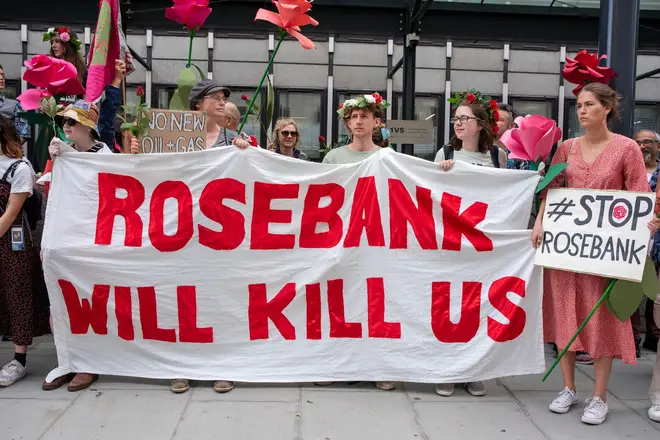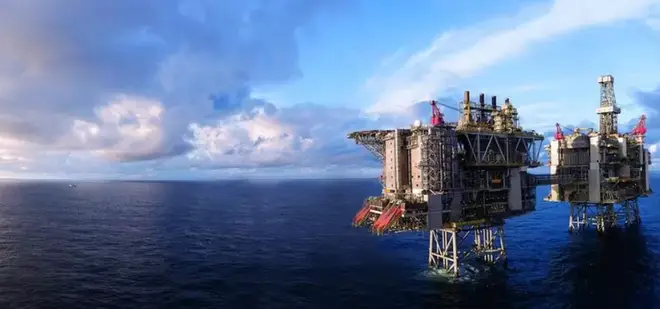
Tom Swarbrick 4pm - 7pm
27 September 2023, 12:39 | Updated: 27 September 2023, 13:32

Prime Minister Rishi Sunak has said the controversial decision to allow the Rosebank oil and gas field to go ahead is the “right long-term decision” for the UK’s energy security, despite growing condemnation from climate change campaigners and the threat of an immediate legal challenge.
Just a week after he rolled back his government’s net zero targets, Sunak said the decision by the North Sea Transition Authority to green light drilling in the North Atlantic was required as part of the transition to renewable energy.

Read More: Rishi Sunak’s delayed bans on petrol and diesel cars and gas boilers - what does it mean for you?
Read More: UK’s cheapest supermarket petrol station revealed – which could save you up to £7 on a tank of fuel
On social media platform X he said: “The Climate Change Committee have said you don’t reach Net Zero by wishing it. As we make the transition to renewables, we will still need oil and gas – it makes sense to use our own supplies such as Rosebank. This is the right long-term decision for the UK’s energy security.”
However Scotland's First Minister Humza Yousaf said he was “disappointed” Rosebank had been given the go-ahead, and questioned whether it would increase energy security.
He said: “We've raised concerns that the majority of what is extracted from Rosebank will go overseas, not remain in Scotland or the UK.
“We recognise the significant contribution the oil and gas sector makes to Scotland. However, our future is not in unlimited oil and gas extraction. It is in accelerating our just transition to renewables.
"New oil and gas fields being approved risk the pace of that transition.
"In the face of a climate catastrophe, the UK Government have dropped their green pledges & committed to approving 100 new oil and gas licences. That isn't climate leadership. It is climate denial.
"Scotland will remain on the right side of history and demonstrate climate leadership."
He said his government was” investing £500m so workers and industry transition from fossil fuels to a net zero future.”
One if his ministers, Scottish Greens co-leader Patrick Harvie went further condemning the decision and claimed the UK government was “wrecking our future.” He added: “These people would literally burn your future for profit.”

But Scottish Secretary Alister Jack described the decision as “great news.”
The North Sea has a huge role to play in ensuring the UK's energy security while we transition to net zero, he said.
"It's really important that we maximise our domestic oil and gas reserves, which mean lower emissions than imports, while reducing any reliance on hostile states.
"Rosebank will play a big role in that, as well as growing our economy and providing skilled jobs in Scotland for generations to come."
The oil and gas regulator, the North Sea Transition Authority (NSTA), said Rosebank, which lies 80 miles west of Shetland, was approved "in accordance with our published guidance and taking net zero considerations into account throughout the project's lifecycle".
It is believed Rosebank contains up to 350 million barrels of oil and Equinor, the Norwegian firm behind the project, says it could produce 69,000 barrels of oil per day - about 8% of the UK’s projected daily output between 2026 and 2030 - and could also produce 44 million cubic feet of gas every day.
And while it is likely to cost £4.1bn to develop, it could receive a taxpayer-funded subsidy of £3.75bn through tax breaks and the windfall tax loophole.
Gilad Myerson, the executive chairman of Ithaca Energy - a company with 20% stake on this project defended Rosebank. He said: "The objective is to make sure the emissions per barrel is as low as possible” and that it was "simply incorrect" that most of the oil would be used outwith the UK.
He also said Rosebank "will be providing over 1,600 jobs. It's going to be providing a significant amount of tax revenues for the treasury going forwards".
However campaign group Uplift says it intends to launch an immediate legal challenge to the decision.
It believes the approval of Rosebank is unlawful as it is “ incompatible with the UK’s climate targets” and suggests there has been a potential failure "to assess the environmental impacts created by burning Rosebank’s oil; the marine environmental impacts of the field; and a potential failure to ensure a transparent and participatory decision-making process."
Tessa Khan, executive director of Uplift and a climate lawyer said: “There are strong grounds to believe that the way this government has come to this decision is unlawful.
“ We shouldn’t have to fight this government for cheap, clean energy and a liveable climate, but we will."T
Friends of the Earth Scotland also branded the decision “disgraceful.”It’s oil and gas campaigner Freya Aitchison said “Fossil fuels are driving both climate breakdown and the cost-of-living crisis, yet the UK Government is slamming its foot down on the accelerator.
"The fight against Rosebank will continue. Fossil fuel projects rely not only on Government support, but also financing and broader public acceptance.
"People power forced Shell to pull out of the controversial Cambo oil field and Rosebank is three times bigger.
"There is widespread anger at this irresponsible decision and we will keep up the pressure on the UK and Scottish Governments to reject the Rosebank oil field, as well as taking the fight directly to Equinor and Rosebank's corporate financiers."
David Whitehouse, the boss of Offshore Energy UK which represents the oil and gas industry, said the decision was “good news for our jobs, our economy, and our secure energy future.
"By promoting homegrown production, we avoid costlier, higher carbon imports while making more reliable supplies of energy in the UK, for the UK.
"We need more projects like Rosebank if we are serious about delivering a homegrown UK energy future.
"We have around 283 fields in the North Sea, but over 180 of those will stop producing within the next decade.
"If these are not replaced, we will import 80% of the oil and gas the UK we will need."
Scotland's former First Minister Nicola Sturgeon posted on social media that she agrees with Green Party MP Caroline Lucas, who described the decision to give consent to Rosebank as the "greatest act of environmental vandalism in my lifetime".
Ms Sturgeon said: "Agree with @CarolineLucas. Also, by consuming scarce resources that could be going to renewables, it risks slowing the green transition and the jobs that come from it.
"That's not in interests of those who work in oil & gas - they need that transition to happen at pace."
Labour has said that, while it opposed the Rosebank development, it would not revoke the licence if it won the next general election.
Shadow business and trade secretary Jonathan Reynolds said: "We don't support Rosebank, we think the priority for the country should be transitioning away from fossil fuel partly because of the volatility of the price of fossil fuels. And we've seen since Russia's invasion of Ukraine just what that has meant not just for heating prices but for electricity"
Green Party MP Caroline Lucas said: "Giving the green light to this huge new oil field is morally obscene. This Government must be held accountable for its complicity in this climate crime.
"Amidst a summer of raging wildfires and the hottest July on record, this Government approves the biggest undeveloped oil and gas field in the North Sea - set to produce more than the combined CO2 emissions of all 28 low-income countries in the world.
"Energy security and cheaper bills aren't delivered by allowing highly-subsidised, foreign-owned fossil fuel giants to extract more oil and gas from these islands and sell it overseas to the highest bidder."
The companies behind the Rosebank oil field, Ithaca Energy and Equinor, said they had taken their final investment decision to invest 3.8 billion dollars (£3.1 billion) in the project in the first phase of development.
They said that the field is expected to start producing in 2026-2027, with the project supporting around 1,600 at its peak during construction, and long-term will supply around 450 jobs.
Arne Gurtner, senior vice president upstream at Equinor in the UK, said: "We know that the world needs to transition to new, cleaner energy systems and our broad energy investments into the UK support this. And while we do this there is going to be a continued need for oil and gas, which currently meets 76% of the UK's energy needs."
Norway's Equinor supplies 29% of the UK's gas and 15% of its oil.